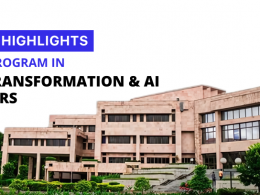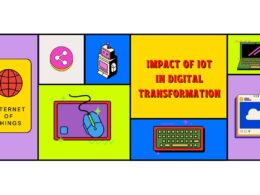In today’s rapidly evolving technological landscape, digital transformation has become more than just a buzzword—it’s a fundamental force driving change across industries. While organizations are racing to stay ahead, the focus on sustainability and green technology is gaining significant traction.
In this blog, we’ll explore the intersection of sustainability and green tech within the context of digital transformation.
How can businesses harness these forces to not only innovate but also reduce their environmental footprint?
Let’s embark on this journey towards a greener and more sustainable digital future.
The Digital Transformation Boom
Digital transformation is reshaping the way we do business, consume information, and interact with the world. It encompasses the integration of digital technology into all aspects of an organization, fundamentally altering how it operates and delivers value to customers.
The core drivers behind digital transformation include improved efficiency, enhanced customer experiences, and the ability to adapt to rapidly changing market conditions.
As businesses across the globe embrace this revolution, the question arises: how can they incorporate sustainability and green technology into their digital transformation initiatives?
The Sustainability Imperative
The concept of sustainability is no longer just a corporate social responsibility catchphrase. It has evolved into a core business strategy, and customers are now scrutinizing companies’ eco-credentials. Sustainability goes beyond reducing paper usage and recycling—it extends to reducing carbon emissions, conserving resources, and preserving ecosystems.
Businesses are recognizing that integrating sustainability into their operations is not only beneficial for the planet but also for their bottom line. Sustainability is becoming a critical component of business strategy, influencing product development, supply chain management, and corporate culture.
Green Tech: The Driving Force
At the heart of the sustainability movement within digital transformation is green technology, often referred to as “green tech.“ Green tech encompasses a wide range of innovations aimed at reducing the environmental impact of various industries.
From renewable energy sources to energy-efficient devices and eco-friendly materials, green tech is rapidly becoming an integral part of the digital transformation landscape. Businesses are actively seeking technologies that align with their sustainability goals and contribute to a reduced carbon footprint.
Green Tech Integration: Pioneering the Eco-Revolution
As the world races towards a more sustainable future, the integration of green technology, often referred to as “green tech,” within the realm of digital transformation is rapidly emerging as a driving force.
It is imperative to delve deeper into the key areas where green tech is becoming a game-changer, not only revolutionizing the business landscape but also contributing significantly to environmental conservation.
1. Renewable Energy Solutions: The Digital Energy Revolution
In the fast-paced world of digital transformation, the demand for energy is skyrocketing. This surge in energy consumption is a side effect of the transition to digital platforms and data centers, which have become the backbone of modern business operations. However, this transition brings with it a remarkable opportunity—the shift to renewable energy solutions.
Companies, including tech giants, are actively embracing renewable energy sources like solar and wind power. This shift is not only environmentally responsible but also economically viable. Several prominent organizations have pledged to utilize 100% renewable energy, setting an inspirational example for others to follow.
By incorporating solar panels, wind turbines, and other sustainable energy sources, businesses are actively contributing to reducing their carbon footprint and promoting a greener and cleaner energy landscape.
2. Energy-Efficient Infrastructure: The Quest for Sustainability
Green tech’s influence isn’t confined solely to energy sources. It extends to creating energy-efficient infrastructure, which is an essential aspect of the sustainability journey. This category encompasses innovative practices that focus on minimizing energy consumption, optimizing energy utilization, and implementing advanced cooling systems.
In the digital era, data centers are the backbone of most industries. Hence, designing data centers that are energy-efficient has become paramount. The construction of sustainable data centers aims to reduce energy consumption, decrease cooling costs, and create a more environmentally friendly IT ecosystem.
Moreover, smart buildings equipped with cutting-edge technologies are being developed to optimize energy usage by automatically adjusting lighting, heating, and cooling based on occupancy and external conditions.
3. Sustainable Supply Chains: Nurturing Transparency and Responsibility
Sustainability doesn’t stop within the confines of a company’s walls. It extends throughout the entire product lifecycle, from sourcing to disposal. This is where sustainable supply chains play a crucial role, empowered by digital technologies such as blockchain.
These innovative supply chains enable companies to meticulously track their products from source to shelf. They ensure eco-friendly sourcing by tracing the origins of materials, guaranteeing ethical practices, and maintaining transparency throughout the production and distribution process.
Sustainable supply chains provide consumers with the assurance that the products they purchase have been sourced and produced responsibly, contributing to a more sustainable future.
4. Eco-Friendly Products and Services: Meeting Consumer Demand
The modern consumer is increasingly environmentally conscious, leading businesses to design eco-friendly products and services. From electric vehicles and biodegradable packaging to sustainable clothing and energy-efficient appliances, these innovations are driving the sustainability agenda forward.
Companies are embracing this demand for sustainability by creating products and services that cater to consumers looking for eco-conscious choices. By offering these environmentally responsible alternatives, businesses are not only meeting consumer demands but also reducing their environmental impact, fostering a greener world.
5. Data-Driven Sustainability: The Power of Analytics
In the digital transformation era, data analytics plays a pivotal role in sustainability efforts. Organizations are harnessing the power of data to measure their environmental impact, set ambitious sustainability goals, and track their progress.
Data-driven sustainability is not limited to tracking and reporting; it’s about using data to drive change. By analyzing environmental data, organizations can identify areas where they can reduce their carbon footprint and implement eco-friendly practices. This approach ensures that sustainability is not just a buzzword but a measurable and attainable goal.
The integration of green tech into the digital transformation landscape represents a significant stride towards a more sustainable future. These key areas of integration are reshaping industries, allowing businesses to reduce their environmental footprint, and contributing to a more eco-conscious world.
Ready to become a leader in the digital transformation landscape?
Join Accredian’s Digital Transformation Course in partnership with XLRI, and take the first step towards an exciting career in the ever-evolving digital world.
 Pin
PinExplore more insightful blogs like this, and equip yourself with the knowledge to drive change and innovation. Your journey to a transformative future begins here.






